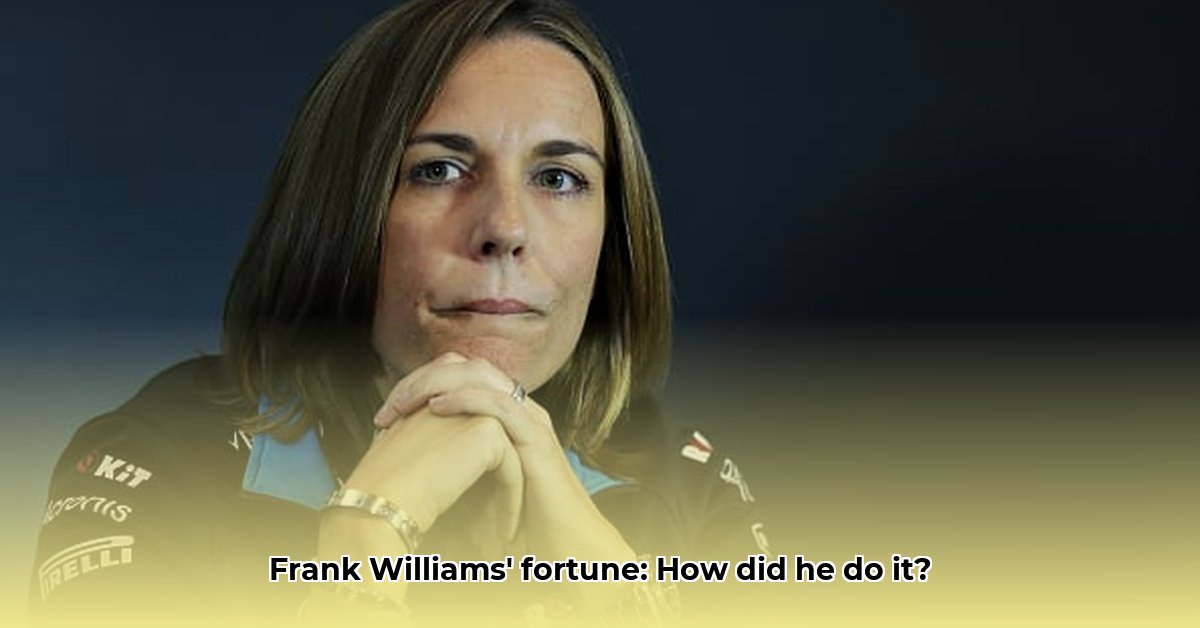
Frank Williams' $200 Million Fortune: A Case Study in F1 Business Acumen
Frank Williams, a name synonymous with Formula 1 success, amassed an estimated $200 million fortune, while his team, Williams Racing, boasted a valuation of $400 million. This article analyzes the strategic decisions and financial prowess behind this remarkable achievement, offering actionable insights for aspiring entrepreneurs and investors in the high-stakes world of Formula 1. It's not simply a story of wealth; it's a masterclass in building a sustainable and profitable racing empire. For more on similar figures, see Francis Ellis' net worth.
Building a Racing Dynasty: The Williams Racing Story
Frank Williams’ journey to the pinnacle of Formula 1 was not a sprint, but a marathon of calculated risks and astute business decisions. He recognized early on that Formula 1 was as much a business as it was a sport. He meticulously crafted Williams Racing into a high-performance machine designed for both on-track victories and off-track financial success. This holistic approach, focusing on both racing performance and financial strategy, formed the bedrock of his empire. How did he achieve this seemingly impossible balance? Let's delve deeper.
The Financial Engine: Deconstructing Williams' Success
The $200 million net worth and the $400 million valuation of Williams Racing were not accidental; they were the culmination of decades of strategic planning and execution. The team's global brand recognition, its enduring legacy, and its consistent track record all contributed significantly to its substantial financial valuation. But what specific strategies drove this financial success? What are the actionable takeaways for those looking to build their own successful business ventures?
Winning Strategies: Key Elements of Williams' Success
Several key strategies propelled Williams Racing and, consequently, Frank Williams' personal wealth, to extraordinary heights. These strategies can be applied, in modified forms, across numerous industries.
Talent Acquisition: Williams had an exceptional ability to identify and cultivate exceptional driving talent. Investing in promising drivers early in their careers proved to be a strategic move that yielded significant returns both on and off the track. This wasn't just about speed; it was about recognizing and nurturing future champions. How did his early investment in driver talent translate into long-term financial success?
Technological Innovation: Williams consistently invested in cutting-edge technology, always striving for a competitive edge. However, this wasn't reckless spending; it was calculated investment, carefully balancing technological advancements with prudent cost management. This demonstrates the importance of innovation without jeopardizing fiscal responsibility. How effectively did Williams balance innovation and cost control?
Strategic Partnerships: Williams forged strategic alliances with brands that shared his vision, creating mutually beneficial partnerships that extended beyond mere financial transactions. These partnerships provided financial stability and elevated brand recognition, maximizing the value for all involved. What were the key characteristics of his successful business partnerships?
This trifecta of talent, technology, and strategic partnerships fueled the team's – and Frank Williams' – extraordinary success.
Navigating the Risks: The Challenges of Formula 1
Formula 1 is a high-risk, high-reward environment. Unpredictable sponsorship agreements, escalating operational costs, and ever-changing regulations pose significant financial challenges. A single unsuccessful season can erode years of progress.
Williams demonstrated remarkable resilience by:
Diversifying Revenue Streams: He ensured the team wasn't overly reliant on any single income source, creating a protective financial cushion against unexpected setbacks.
Long-Term Strategic Planning: He prioritized long-term stability, building a team adaptable to the ever-shifting landscape of Formula 1.
Risk Mitigation: He proactively identified and addressed potential risks, ensuring the team was prepared for unexpected challenges.
This prudent approach, combined with his strategic vision, contributed significantly to Williams Racing's lasting financial success.
Lessons from the Legend: Entrepreneurial Insights from Frank Williams
Frank Williams' story offers invaluable lessons for entrepreneurs across all industries:
Long-Term Vision: Sustainable success requires a long-term vision and a commitment to building a robust, enduring business model.
Adaptability: The ability to adapt to changing circumstances and embrace innovation is crucial for long-term survival and growth.
Prudent Risk Management: A clear understanding of potential risks and the implementation of effective mitigation strategies are vital for success.
Team Building: Surrounding oneself with talented and dedicated individuals is critical to achieving ambitious goals.
These lessons highlight the importance of strategic thinking, long-term planning, and the ability to navigate uncertainty in high-stakes environments.
Hypothetical Financial Breakdown of Williams Racing's Revenue Streams
While precise financial details remain confidential, a hypothetical revenue breakdown provides a general overview of the potential sources contributing to Williams Racing's financial success. The exact proportions would require access to confidential financial information.
| Revenue Source | Potential Contribution (Estimate) | Notes |
|---|---|---|
| Sponsorship Agreements | Very Significant | Key revenue driver; fluctuations depend on market conditions and performance. |
| Prize Money | Substantial | Directly tied to on-track performance; consistency boosts earnings. |
| Television Broadcast Rights | Moderate | Shared amongst teams; less direct control over income. |
| Merchandise & Licensing | Growing | Growing revenue stream, capitalizing on brand recognition and popularity. |
This simplified view illustrates the multi-faceted nature of Formula 1 team finances.
Conclusion: A Legacy of Success
Frank Williams' journey is more than just a story of financial success; it's a compelling case study in astute business management, exceptional leadership, and the importance of long-term vision. His legacy extends far beyond the racetrack, serving as a powerful source of inspiration and actionable insights for aspiring entrepreneurs and business leaders worldwide. His emphasis on strategic partnerships, calculated risk-taking, and relentless pursuit of innovation provides a roadmap for building a sustainable and thriving enterprise, regardless of industry.